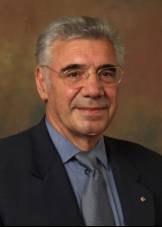Dr. Franco Maloberti
Microelectronics Chair Professor
Fellow, IEEE
Ph.D., (honorary 1996)
P.O. Box 830688, EC33
Richardson, TX 75083-0688
Office: 3.512
Tel: (972) 883-2996
Fax: (972) 883-2710
E-mail:franco.maloberti@utdallas.edu |
 |
|
Biography
THE UNIVERSITY OF TEXAS AT DALLAS
Department of Electrical Engineering
Franco Maloberti received the Laurea Degree
in Physics (Summa cum Laude) from the University of Parma, Parma
Italy, in 1968 and the Dr. Honoris Causa degree in electronics
from the Instituto Nacional de Astrofisica, Optica y Electronica
(Inaoe), Puebla, Mexico in 1996. In 1993 he was a Visiting
Professor at ETH-PEL, Zurich. He was Professor of
Microelectronics and Head of the Micro Integrated Systems Group
University of Pavia, Pavia, Italy and the TI/J.Kilby Analog
Engineering Chair Professor at the Texas A&M University. He is
currently the Distinguished Microelectronic Chair Professor at
University of Texas at Dallas and part-time Professor at the
University of Pavia, Italy. His professional expertise is in the
design, analysis and characterization of integrated circuits and
analogue digital applications, mainly in the areas of switched
capacitor circuits, data converters, interfaces for
telecommunication and sensor systems, and CAD for analogue and
mixed A-D design. He has written more than 250 published papers,
three books and holds 15 patents. He was in 1992 recipient of
the XII Pedriali Prize for his technical and scientific
contributions to national industrial production. He was
co-recipient of the 1996 Institute of Electrical Engineers
(U.K.) Fleming Premium for the paper "CMOS Triode Transistor
Transconductor for high-frequency continuous time filters." He
has been responsible at both technical and management levels for
many research programs including ten ESPRIT projects and has
served the European Commission as ESPRIT Projects' Evaluator,
Reviewer and as European Union expert in many European
Initiatives. He served the Academy of Finland on the assessment
of electronic research in Academic institutions and on the
research programs' evaluations.
Dr. Maloberti was Vice-President, Region 8,
of the IEEE Circuit and Systems Society from 1995 to 1997 and an
Associate Editor of IEEE-Transaction on Circuit and System-II.
He received the 1999 IEEE CAS Society Meritorious Service Award,
the 2000 CAS Society Golden Jubilee Medal, and the IEEE
Millenium Medal. He is the President of the IEEE Sensor Council
and member of the Board of Governors of the IEEE CAS Society. He
is a member of the Italian Electrothecnical and Electronic
Society (AEI), the Editorial Board of Analog Integrated Circuits
and Signal Processing, and Fellow of IEEE.
For more details pls. refer to https://www.utdallas.edu/%7Efranco.maloberti/
|
Data Converters for Communications:
Opportunities and Challenges
for Architectures and Analog Design
Franco Maloberti
The University of Texas at Dallas, USA and University of Pavia,
Italy
Modern communication systems use functions like
filtering, modulation, demodulation, clock recovery, gain control,
and adaptive equalization. All these function can be both achieved
in the analog or in the digital domain. The present trend is to
place more of the functionality in the digital side. Thus, new
communication architectures and their partitioning move the
transition from analog to digital closer and closer to the antenna.
As a result, complex algorithms and software-defined operations can
be attained. However, the position of the transition point between
analog and digital has a direct bearing on difficulties in the data
converter design.
The differences between mobile communication
standards (GSM, IS-136, IS-95, WCDMA, cdma2000) lead to stringent
performance requirements in the 3G/2G base-station and handset
architectures. The evolution of existing 2G architectures towards 3G
and beyond requires ensuring backward compatibility. Base-station
transceiver must deal with narrowband for 2G (TDMA up to 200 kHz)
and wideband CDMA 3G (up to 5 MHz). The adjacent channel blocking
features must comply with the must demanding request (100 dB of SFDR
with GSM). Designing handset faces similar technical challenges,
especially for future evolutions that foresee Bluetooth and ad-hoc
links with sensor networks. All this problems address a number of
design issues involving wideband RF components, wideband ADCs, and
high-performance signal processors.
Data converters are key elements in defining the
right architecture that is capable to attain cost effectiveness,
multi-standard capability, backward compatibility, and low power
consumption. For this, the system designer must know in good details
features, limits and future trends in the data converter area.
Conversely, analog designers must be aware of problems, requirements
and future evolution of standards and architectures used in
communication systems.
This presentation will discuss, from an analog
designer viewpoint, present and future system architectures and
data-converter solutions. They generate, at the same time,
opportunities and challenges for both system designers and analog IC
designers.
|